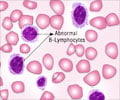A study says that a single cell containing a unique abnormality can result in certain types of blood cancers.

By taking a single blood-generating stem cell isolated from malignant MPNs and transplanting it into healthy mice, researchers in Switzerland show that this lone cell with the mutated JAK2 protein can develop into a full-blown MPN. The resulting MPNs, in turn, also bear the JAK2 mutation. In addition, this group of scientists showed that cells in the MPNs with JAK2-V617F have the ability to renew themselves and increase their numbers.
Attempts to recapitulate this type of single-cell MPN initiation in mice have not been successful in the past. The results from this study open up exciting new opportunities to examine single JAK2-V617F mutant cells and follow tumor initiation and progression of human MPN cancers.
Source-Eurekalert











